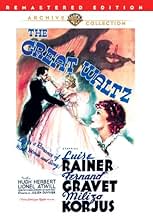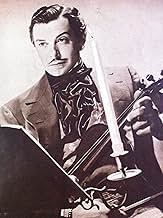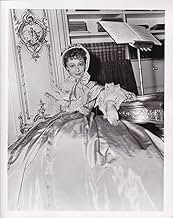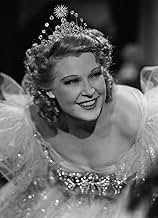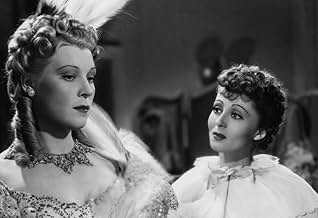Aggiungi una trama nella tua linguaJohann Strauss II pursues his passion for waltzes in 1845 Vienna, facing societal resistance. His music gains popularity through opera singers, leading to fame and personal conflicts between... Leggi tuttoJohann Strauss II pursues his passion for waltzes in 1845 Vienna, facing societal resistance. His music gains popularity through opera singers, leading to fame and personal conflicts between his wife and a passionate affair.Johann Strauss II pursues his passion for waltzes in 1845 Vienna, facing societal resistance. His music gains popularity through opera singers, leading to fame and personal conflicts between his wife and a passionate affair.
- Regia
- Sceneggiatura
- Star
- Vincitore di 1 Oscar
- 2 vittorie e 3 candidature totali
- Johann Strauss
- (as Fernand Gravet)
- Wertheimer
- (as Sig Rumann)
- Revolutionary
- (non citato nei titoli originali)
Recensioni in evidenza
Yes, the story is utter hokum and bears only superficial similarity to the actual Johann Strauss II or the the Vienna of his time. Why is that a surprise to some? It's a given! Hollywood was always like that, now as ever. What Duvivier does manage to convey is the dream of Vienna, the illusory magic of the city that was the capital of musical Europe, and thereby of the world.
Duvivier made this amazing film with attention to every detail, the smallest character performance, even the extras have obviously been minutely directed. The film is always stylistically innovative, the editing fast-paced and often surprising, the style whirling, ecstatic, dynamic, and at all times slightly camp. There are so many show-stopping scenes in the film that I wouldn't even know where to start listing them. The script is wonderful, the dialogue consistently funny, interiors are luminous, the cinematography revolutionary and clearly related to what Rouben Mamoulian was doing in Hollywood in the early 1930's.
The actors? Absolutely great. Fernand Gravey does a fair job, but the two women shine above everything else. Polish coloratura soprano Miliza Korjus sings the Strauss songs in a way that admittedly sound rather corny and old-fashioned today, but as an actress, playing the opera diva that Strauss is two-timing his wife with, she is gorgeously wicked, one of the most glamourous beings even in the Hollywood of the 30's. But even she is overshadowed - by Luise Rainer who, in this picture, can do no wrong in a part that is very, very hard to make substantial. She is Strauss' long-suffering, unselfish wife, but there is absolutely no melodrama in her performance. The evolution of the chararacter that is Poldi Strauss is extremely well-calculated, and she remains the centre, the gravity of the picture. And when we think that now she has suffered long enough, she says, "Now is not a time to lie down, now is time to act!".
Forget all petty reservations and brace yourselves for a real treat, a film that time has all but forgotten, but a masterpiece none the less.
Swirling waltzes are captured with such superb angles in the Oscar-winning camerawork, it's no wonder David O. Selznick was impressed enough to insist that his own technical staff derive inspiration from viewing the film.
Soprano Miliza Korjus does some excellent trills as the operatic diva who steals Strauss from his wife (temporarily) until the obligatory happy ending. Luise Rainer suffers gracefully (in an insufferable role as the wife!!) and Fernand Gravet does well as the composer. His scenes with Miliza Korjus are what makes the film the gem that it is. She all but steals the film and was nominated for a Supporting Actress Oscar and then disappeared from the American scene, returning to Europe to resume her operatic career.
It's impersonal but it nevertheless displays Duvivier's extraordinary eclecticism."The great waltz" is a good work,made with care and taste and shows that Duvivier could have been a great musicals director,if he had wanted to.Half of the movie consists of instrumentals or songs,which makes sense,for it is a movie dealing with Strauss's life.His private life does not interest that much Duvivier who avoids the traps of a linear biography.However,there are snatches of melodrama towards the end,mainly in the scenes between the moving Luise Rainer and Miliza Korjus in the theater.Fernand Gravey (spelled "Gravet" in the cast and credits)is the only French actor here.He had begun his American career with Mervyn LeRoy in 1937.
All the musical scenes are dazzling ;the "blue Danube" treatment is excellent,a waltz which would be used by dozens of directors,from Renoir ("Boudu Sauvé des Eaux" ) to Kubrik ("2001" ) to Cimino ("Heaven's gate"). Other good sequence: Strauss composing a new tune while he is hearing a horse' s trot.
Lo sapevi?
- QuizToscha Seidel, the Russian virtuoso violinist, was hired especially to dub the solos on the soundtrack for Johann Strauss (Fernand Gravey) and began a new career working as a concert master at MGM and other studios.
- Citazioni
Johann 'Schani' Strauss II: Thanks for firing me, Mr. Wertheimer. Goodbye, you worms!
- ConnessioniFeatured in Another Romance of Celluloid (1938)
- Colonne sonoreTales From the Vienna Woods, Op.325
(1868) (uncredited)
Music by Johann Strauss
Lyrics by Oscar Hammerstein II
Hummed by Fernand Gravey as it is being composed
Sung by Miliza Korjus
Played as background music often
I più visti
- How long is The Great Waltz?Powered by Alexa
Dettagli
- Tempo di esecuzione
- 1h 44min(104 min)
- Colore
- Proporzioni
- 1.37 : 1


